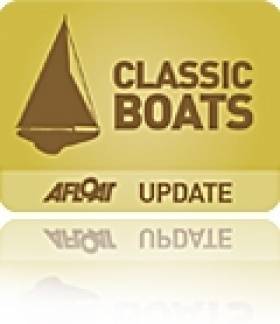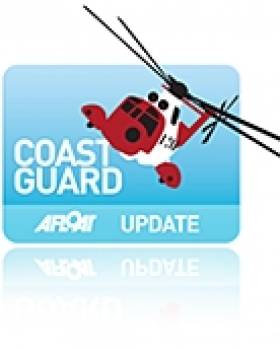Displaying items by tag: Dover
UK's Port of Dover Celebrates New Marina Opening
The new Dover marina, now taking pride of place at the UK's busiest international ferry port on the UK south coast, will become home to over 160 yachts and small leisure boats after opening this month. Around 50 berth holders are already in the new site permanently, with more continuing to move over throughout the first half of 2023.
With the sun beaming down, the White Cliffs and Dover Castle as a backdrop, and some of the most prestigious cruise ships sitting alongside, the Marina becomes a star of Dover’s revived waterfront.
Surrounded by the Marina Curve and only a short walk from Dover Priory station, it provides the perfect opportunity for visitors and berth holders to celebrate local culture and history through new leisure experiences and events.
 With the first glimpse of spring and a fresh look and identity recently launched by the Port, Dover's biggest ever all year-round events showcase has been announced for English Tourism Week, with the new waterfront as its base
With the first glimpse of spring and a fresh look and identity recently launched by the Port, Dover's biggest ever all year-round events showcase has been announced for English Tourism Week, with the new waterfront as its base
Last year’s events on the Marina Curve already proved extremely popular, and with the Marina now open, the waterfront will provide fantastic entertainment and leisure opportunities this spring/summer season.
Doug Bannister, Chief Executive of the Port of Dover said:
“The Port is transforming, and the Marina opening is the perfect showcase of our new modern look and identity. My thanks go to the Marina and Dover Western Docks Revival (DWDR) teams for working so hard to provide this world leading facility for our berth holders.
It’s also a fantastic new attraction for Dover and being perfectly situated next to our cruise terminals, brings communities together from across the nation and globally. We face a bright future, and I am confident that the waterfront will soon become one of the best destinations for exploring the South East coast.”
Chris Windsor, Marina Manager said:
“The official opening marks a milestone for the Marina and Port – I’m delighted that our berth holders have started to settle in their new, permanent base, and can make the most of the brilliant opportunities now available to them.
We take pride in being a seamless and sustainable port, and I have no doubt that the Marina and my team, will continue to provide berth holders with an exceptional experience and service.”
The highlight facilities for berth holders include a dedicated fueling station on its own berth, a hard standing and level boatyard with large capacity, and a new Marina office. All features of the new Marina and waterfront have been built around a sustainable mixed-use scheme.
The Dover Marina showcase will take place on 20th May, with tours, displays and demonstrations, plus boat sales, live music and street food.
A new year-round programme of events surrounding the Marina Curve has recently been announced, with more information here.
Vandals Damage Dover's Bronze Age Boat
#BronzeAgeBoat - Dover's replica Bronze Age boat has been moved to a secure location after being vandalised, according to Kent Online.
It's reported that a tent covering the vessel on the port town's Roman Lawn was damaged, and saw marks were made on one side.
The incident comes just days ahead of the launch of a campaign to fund works on the historic boat - a half-size replica of one built some 3,500 years ago - to make it seaworthy after it sank in the Dover docks last year.
A similar project in Cornwall saw the fruit of its own restoration work this past March, when their 50ft Bronze Age boat was set afloat in Falmouth.
As previously reported on Afloat.ie, the Cornish boat is crafted from two giant oak logs and using tools similar to what boat builders of the time world have used in the post-Neolithic era.
Uk Coastguard Announces Public Meeetings to Discuss Modernising Service
The purpose of the meeting is to provide an opportunity for the local communities around the existing Maritime Rescue Coordination Centres (MRCCs) to hear more about the proposals, ask questions of MCA representatives and have the opportunity to express their views.
Each meeting will be independently chaired and will begin at 7:30pm, expecting to draw to a close by 9pm.
Humber - Monday, 21 February 2011, The Spa, South Marine Drive, Bridlington, East Yorkshire. YO15 3JH
Thames - Tuesday 22 February 2011, Columbine Centre, Princes Esplanade, Walton on the Naze, Essex. CO148PZ
Yarmouth - Wednesday 23 February 2011, Great Yarmouth Town Hall, Hall Plain, Great Yarmouth, Norfolk. NR30 2QF
Aberdeen - Wednesday, 23 February 2011, Pittodrie Stadium, Pittodrie Street, Aberdeen. AB24 5QH
Forth - Thursday, 24 February 2011, Waid Academy, St Andrews Road, Anstruther, Fife. KV10 3 HD
Dover – Thursday, 24 February 2011, Dover Town Hall, Biggin Street, Dover, Kent. CT16 1DL
Shetland - Monday, 28 February 2011, Town Hall, Upper Hillhead, Lerwick, Shetland. ZE1 0HB
Stornoway - Tuesday, 1 March 2011, Nicholson Institute, Springfield Road, Stornoway. HS1 2PZ
Solent - Tuesday 1 March 2011, Thorngate Halls (Community Centre), Thorngate Halls, Bury House, Bury Road, Gosport, Hampshire. PO12 3PX
Holyhead - Wednesday, 2 March 2011, Holyhead High School, Alderley Terrace, Holyhead, Gwynedd, Isle of Anglesey. LL65 1NP
Clyde - Wednesday 2 March 2011, Port Glasgow Town Hall, 35 King Street, Port Glasgow. PA14 5HD
Belfast - Thursday, 3 March 2010, Marine Court Hotel, 18-20 Quay Street, Bangor. BT20 5ED
Liverpool – Thursday, 3 March 2011, Southport Convention Centre, The Promenade, Southport. PR9 0DZ
Milford Haven – Friday, 4 March 2011, Cleddau Bridge Hotel, Essex Road, Pembroke Dock. SA72 6EG
Swansea – Monday, 7 March 2011, Marriott Hotel, Maritime Quarter, Swansea. SA1 3SS
Portland - Tuesday, 8 March 2011, All Saints Church of England School, Sunnyside Road, Wyke Regis, Weymouth. Dorset, DT49BJ
Falmouth – Wednesday 9 March 2011, Tremough Campus, Treliever Road, Penryn, Cornwall. TR10 9EZ
Brixham - Thursday, 10 March 2011, Brixham College, Higher Ranscombe Road, Brixham. TQ5 9HF
Kirkwall - Tuesday, 15 March 2011, Town Hall, Broad Street, Kirkwall. KW15 1DH
Ullapool – Wednesday, 16 March 2011, Macphail Centre, Mill Street, Ullapool, Ross-shire. IV26 2UN
The details of these proposals, together with the consultation documents, can be found on the MCA website at www.mcga.gov.uk.































































